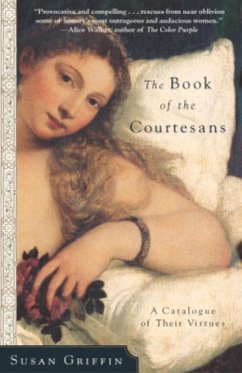From Pulitzer-Prize-nominated author Susan Griffin comes an unprecedented, provocative look at the dazzling world of the West's first independent women, whose lively liaisons brought them unspoken influence, wealth, and freedom. While they charmed some of Europe's most illustrious men honing their social skills as well as their sexual ones, the great courtesans gained riches, power, education, and sexual freedom in a time when other women were denied all of these. From Imperia of sixteenth-century Rome, who personified the Renaissance ideal of beauty; Mme. de Pompadour, the arbiter of all things fashionable in eighteenth-century Paris and Versailles; Liane de Pougy, known in France during the Belle Epoque as "Our National Courtesan”; to Sarah Bernhardt, who, following in her mother's footsteps, supported herself in her early career with a second profession, The Book of the Courtesans tells the life stories and intricacies of the lavish lifestyles of these women. Unlike their geisha counterparts, courtesans neither lived in brothels nor bent their wills to suit their suitors. They were strong- willed, autonomous, and plucky. An open secret, their presence can be felt throughout our culture. The muses who enflamed the hearts and imaginations of our most celebrated artists, they were also artists in their own right. They wrote poetry and novels, invented the cancan at the Moulin Rouge, and presented celebrated acts at the Folies Bergères. They helped to influence and shape the sensibility of modern literature, painting, and fashion. When Greek sculptor Praxiteles wanted to depict Venus he used a famous courtesan as a model, as in later centuries Titian, Veronese, Raphael, Giorgione, and Boucher did when they painted goddesses. When Marcel Proust was a young man it was the courtesan Laure Hayman who took him under her wing, introducing him to the right people, and providing inspiration for one of literature's greatest masterpieces. And they often had considerable political influence too. When King Louis XV needed advice on foreign affairs or appointments of state he turned to Jeanne du Barry as well as Pompadour. In her witty and insightful prose, as Griffin celebrates these alluring and fascinating women, she restores a lost legacy of women's history. She gives us the stories of these amazing women who, starting from impoverished or unimpressive beginnings, garnered chateaux, fine coaches, fabulous collections of jewelry, and even aristocratic titles along the way. And through a brilliant exploration of their extraordinary abilities, skills, and talents which Griffin playfully categorizes as their virtues "Timing, Beauty, Cheek, Brilliance, Gaiety, Grace, and Charm" her book explains how, while helping themselves, through their often outrageous, always entertaining examples, the great courtesans not only enriched our cultural heritage but helped to liberate women from the social, sexual, and economic strictures that confined them. Intensively researched and beautifully crafted, The Book of the Courtesans delves into scintillating but often hidden worlds, telling stories gleaned from many sources, including courtesans' memoirs, presented along with stunning rare photographs to create memorable portraits of some of the most pivotal figures in women's history.
Dieser Download kann aus rechtlichen Gründen nur mit Rechnungsadresse in A, B, BG, CZ, D, DK, EW, E, FIN, F, GR, HR, H, I, LT, L, LR, NL, PL, P, R, S, SLO, SK ausgeliefert werden.









